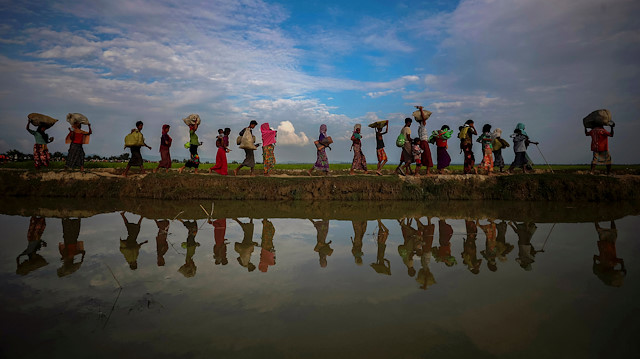
Myanmar is not safe enough for the return of hundreds of thousands of Rohingya in camps in Bangladesh, said Asian parliamentarians on Friday, urging both governments to halt plans for repatriation scheduled to begin this month.
More than 700,000 Rohingya people crossed into Bangladesh in the four months after deadly attacks by Rohingya insurgents on security forces in August, 2017, which were followed by military operations that the United Nations said targeted civilians.
Myanmar has denied most of the allegations.
Bangladesh and Myanmar first reached a deal a year ago to begin repatriation, but the process has been delayed. Officials from both countries met this week and announced that it would begin in mid-November.
"This is a poorly thought-out plan," said Charles Santiago, head of ASEAN Parliamentarians for Human Rights, which is comprised of elected representatives from countries that are members of the Association of Southeast Asian Nations (ASEAN).
He said Myanmar must first put in place plans for the protection and livelihoods of Rohingya who live under an apartheid-like system, facing restrictions on their movements, as well as access to healthcare, employment and education.
Almost all Rohingya lack citizenship, and many of their villages were burned down during the military operations.
"They were still licking their wounds, they are still living in fear," said Santiago, a Malaysian lawmaker who led a fact-finding mission early this year to refugee camps in Bangladesh's Cox's Bazar district.
"We're not expecting them to go back to live in barracks and as squatters," he told the Thomson Reuters Foundation.
Myint Thu, a senior Myanmar foreign ministry official, has said measures are in place to ensure "a secure environment" for the returnees.
Human Rights Watch (HRW) said it had interviewed hundreds of Rohingya refugees and asylums seekers, many of whom said they would only go home if Myanmar guaranteed "security, access to land and livelihoods, freedom of movement, citizenship rights."
Donors should not support the repatriation plan, the New York-based group said.
"Myanmar's government keeps talking about returns, but it has done nothing to allay the Rohingya's fears of being returned to the same violence and oppression they fled," said Bill Frelick, the group's refugee rights director, in a statement. The United Nations in August recommended that Myanmar military leaders be investigated and prosecuted for "genocide, crimes against humanity and war crimes" against the Rohingya.
Stéphane Dujarric, a U.N. spokesman, told reporters this week that conditions "are not yet conducive for a return", and that refugees continue to flee across the border into Bangladesh.





